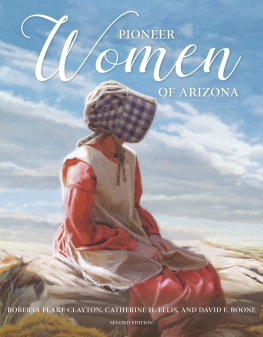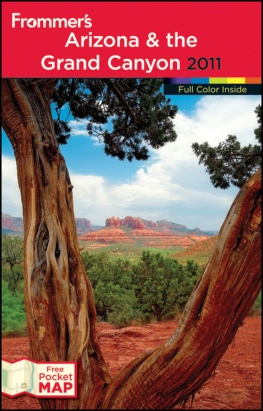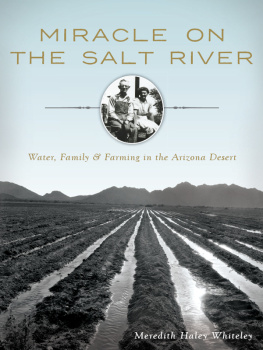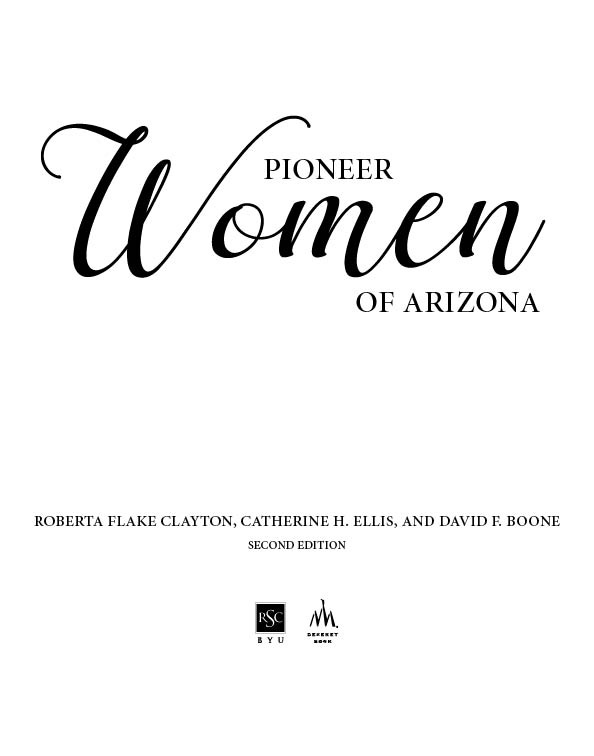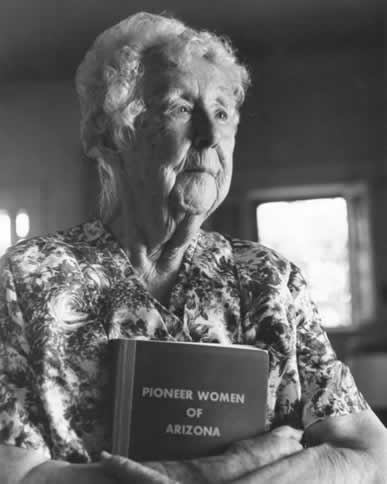Published by the Religious Studies Center, Brigham Young University, Provo, Utah, in cooperation with Deseret Book Company, Salt Lake City.
Visit us at rsc.byu.edu.
2017 by Brigham Young University. All rights reserved.
Printed in the United States of America.
DESERET BOOK is a registered trademark of Deseret Book Company.
Visit us at DeseretBook.com.
Any uses of this material beyond those allowed by the exemptions in US copyright law, such as section 107, Fair Use, and section 108, Library Copying, require the written permission of the publisher, Religious Studies Center, 185 HGB, Brigham Young University, Provo, Utah 84602. The views expressed herein are the responsibility of the authors and do not necessarily represent the position of Brigham Young University or the Religious Studies Center.
Cover design and interior layout by Madison Swapp.
ISBN: 978-1-9443-9409-7
US Retail: $49.99
Library of Congress Cataloging-in-Publication Data
Names: Clayton, Roberta Flake, 1877- author. | Ellis, Catherine H., author. | Boone, David F. author.
Title: Pioneer women of Arizona / Roberta Flake Clayton, Catherine H. Ellis, and David F. Boone.
Description: Second edition. | Provo, Utah : Religious Studies Center, Brigham Young University, in cooperation with
Deseret Book Company, 2017. | Includes bibliographical references and index.
Identifiers: LCCN 2016036642 | ISBN 9781944394097 (alk. paper)
Subjects: LCSH: Women--Arizona--Biography. | Frontier and pioneer life--Arizona. | Mormon pioneers-
Arizona--Biography. | Mormon women--Arizona--Biography. | Mormons--Arizona--Biography. | Polygamy-
Arizona--History. | Arizona--Biography.
Classification: LCC F810 .C53 2017 | DDC 305.409791--dc23 LC record available at https://lccn.loc.gov/2016036642
Dedication, First Edition (1969)
To the descendants of the noble women who pioneered the West, I lovingly dedicate the thirty-three years of research which has gone into the compilation of cherished records of accomplishment.
Roberta Flake Clayton, Compiler-Editor
Roberta Flake Clayton holding Pioneer Women of Arizona , 1969. Photo courtesy of Jannie Lisonbee.
Foreword
Too few readers and researchers are acquainted with Roberta Flake Claytons self-published Pioneer Women of Arizona . In her early nineties and on a meager income when she first published, she sold the majority of her books to relatives or the descendants of the women she wrote about. A few copies of her work reside in special collection libraries throughout Arizona, and photocopies of drafts of her book are in the L. Tom Perry Special Collections at Brigham Young Universitys Harold B. Lee Library. Although she wanted Arizonans to know about the experiences, struggles, and triumphs of ordinary women in Arizonas early years, mainstream historians seldom cite her writings. Her 719-page work is not included in the 2010 bibliography of nonfiction resources compiled and hosted by the Arizona Womens Heritage Trail. Neither does it appear in the updated 2014 bibliography provided to attendees of the first Arizona Womens History Symposium, Arizona Women: Hiding in Plain Sight. Her unintended exclusion from these two bibliographies has meant that Claytons work continues to be largely hidden. Catherine H. Ellis and David F. Boones edition of this 1969 publication will change that. Catherine Ellis, a writer of Arizona history topics, and David Boone at Brigham Young Universitys Department of Church History and Doctrine combine their extensive knowledge of Arizonas history and culture to revise and considerably expand Claytons original work.
Clayton was certainly not the first to gather pioneer recollections. The Arizona Historical Society had been collecting pioneer stories since 1885. Arizonas government began officially collecting firsthand accounts, letters, photographs, and stories of pioneers in 1909 when the legislature created the Office of the Territorial Historian. Later that year Sharlot Hall became the first female to hold a paid territorial office when the governor appointed her as territorial historian, a position she kept until 1912. During those three years she interviewed pioneers, gathered documents and artifacts, and for nearly ten weeks in 1911 traversed the Arizona Strip, an area north of the Grand Canyon that contained several far-flung Mormon settlements. That same year she purchased the unpublished Joseph Fish manuscript of the history of Arizona from the author, a Mormon resident of Snowflake, Arizona.
Typical of these kinds of activities in other territories and states, nearly all of the information Hall and others collected was about men and their settlement activities. Subsequent state historians Thomas E. Farish and James H. McClintock continued the work that Hall had begun. Farish published his eight-volume work on the history of Arizona in 1916, with a focus again on men. In spite of the fact that McClintock had access to several firsthand accounts of female Mormon pioneers in the State Historians Papers, when he finished Mormon Settlement in Arizona in 1921 he rarely mentioned women.
Also in 1921 the Arizona Republican , a major Phoenix newspaper, started collecting firsthand pioneer accounts and established a formal Pioneer Day where early residents throughout the state could come to Phoenix, meet or reunite, and share their stories. This annual event resulted in the publication of numerous pioneer experiences, primarily of men, but it did at last contain the reminiscences of some women. What was unique about Clayton in comparison with these other efforts was her gathering stories of pioneer women, the majority of whom were members of The Church of Jesus Christ of Latter Day Saints (Mormons). As a member of an Arizona branch of the Daughters of Utah Pioneers, in the 1920s she encouraged Mormon women to write or collect stories of their own lives or those of their female ancestors.
Finally, the Federal Writers Project of the late 1930s, a Works Progress Administration effort to provide employment for out-of-work white-collar workers, gave Clayton the opportunity and impetus to collect and write the stories of Arizona female pioneers in earnest. She contributed seventy-nine articles about the lives of individual women and numerous items about pioneer life in Navajo County. When the Writers Project ended in 1940, she continued to collect interviews and autobiographies, stories from descendants of female pioneers, and additional information from a variety of sources. She used her research and these articles as the foundation of her 1969 publication.
As Ellis and Boone point out, there are flaws in Claytons writings. It is sometimes difficult to tell if she wrote sketches from her own personal knowledge, from interviews with living women, from the writings of deceased women, from recollections of descendants, or from other sources. While none of these motivations are problematic, occasionally there are contradictions in the different versions of the biographies. Some of the interviews with living Mormon women and their descendants reflect what oral historians call insider/outsider perspectives. Clayton herself was a member of the Mormon Church and, because she was familiar with issues that faced many of these women in their daily lives, did not appear to ask questions that might clarify shared nuances and meanings. Questions an outsider unaware or unfamiliar with these issues might have put forward. In addition, while the Federal Writers Project may have imposed restrictions on topics like polygamy, once she no longer worked for the Project one can only wish that she had asked questions about life under polygamy, about Mormon womens roles in the fight for womens suffrage, or about social and political changes the women had seen that had affected their lives.

